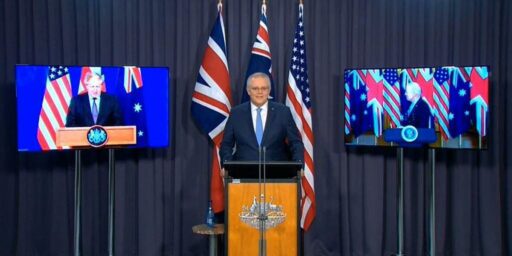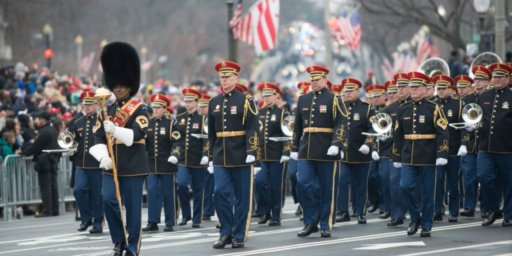Time for an American Foreign Legion?
A respected scholar has an interesting suggestion for fighting the Forever War.
Steven Metz, a scholar at the Army War College’s Strategic Studies Institute, notes that President Obama is quite likely to become the first president to spend his entire two terms in office as a wartime commander-in-chief.
A case can be made that America’s ongoing military involvement in Iraq, Afghanistan, Libya, Yemen, Syria and elsewhere does not constitute “war” in the constitutional and strategic senses of the word. But it is clear that armed strife is the new normal, not an episodic aberration as it was for most of U.S. history. Even so, Americans have not yet fully come to grips with the idea of persistent conflict, instead clinging to the hope that once al-Qaida and the self-styled Islamic State are defeated, peace will return. This will not happen.
It is now time to adjust to what reporter Dexter Filkins called “the forever war.”
Metz points to several implications of this, notably the increased reliance on “direct action” special forces operations and defense contractors.
Using conventional forces for protracted stability, counterinsurgency and counterterrorism operations limited their time preparing for traditional war-fighting. Now there are concerns that this degraded America’s ability to deter aggression and might have been seen as an opportunity for assertiveness by Russia and China. Expanding conventional forces also brought massive financial burdens, particularly in terms of veterans’ benefits. Creating more special operations forces was equally expensive. Even today, with fewer U.S. conventional forces deployed around the world, the expanse and persistence of conflict with transnational extremists places great stress on America’s special operations forces. Contractors remain vitally important in the conflict with extremism, but raise issues of legality and political control, since they cannot be held to the same standards as the uniformed military. And they, too, are expensive, at least in the short term.
The obvious solution, of course, is to stop fighting so many wars of dubious linkage to US national security interests and whose murky objectives never seem to be achieved. Alas, however, there’s been a bipartisan elite consensus going back more than a quarter century now that makes that exceedingly unlikely. If anything, a President Hillary Clinton will be more bellicose than the incumbent. (Arguably, one of the few selling points of a President Donald Trump is that he seems to favor reversing the trend. But his thin-skinned temperament points in the other direction.)
Metz has an interesting alternative:
Composed of foreigners led by French officers, the Foreign Legion was always seen as more expendable—and thus more politically usable—than units manned by French citizens. It proved a redoubtable and effective force and was widely used in all of France’s wars, both conventional and unconventional.
Today the French Foreign Legion continues to attract recruits, many of them admittedly “troubled men looking for adventure and the opportunity to start over in life.” It currently has over 7,000 troops, or about one-and-a-half as many as a U.S. Army brigade combat team. In the past two decades, the legion has deployed to Bosnia, Cambodia, Chad, the Democratic Republic of the Congo, the Republic of Congo, Djibouti, French Guiana, Gabon, Iraq, Ivory Coast, Kosovo, Kuwait, Rwanda, Somalia, Mali, the Central African Republic and Afghanistan. As William Langewiesche wrote in Vanity Fair, “There is no other force in the world today that has known so much war for so long.”
The Foreign Legion is built from men searching for a sense of identity and a purpose in life. It uses them to advance France’s national interest. For the best volunteers, the Foreign Legion provides a gateway to French citizenship.
These are precisely why it might be wise to consider creating an American foreign legion. The world is awash with young men looking for a sense of identity and purpose. Undoubtedly many of them would be interested in the allure of joining an American fighting force. As with the French Foreign Legion, an American one could be very selective and assure discipline by having American officers in command. And an American foreign legion could be a gateway for U.S. citizenship, building on existing programs for foreigners who serve in the U.S. military. The best of the best might even transfer to the regular U.S. military after serving in the American legion, thus gaining the normal benefits provided to a U.S. service member.
I learned a bit about the Foreign Legion as the second reader on a master’s thesis by our French officer last year and the organization has much to commend it. It’s both a highly effective fighting force and an effective reclamation project for men looking to get a fresh start in life.
An American Foreign Legion may well be cheaper than the current alternatives, requiring neither the hefty salaries paid to recruit American mercenaries nor the long-term commitment required to sustain an all-volunteer American military that’s constantly deployed to war. And allowing the US military to specialize in training to fight—and thus deter—major theater wars against near-peer competitors would be an unalloyed good.
Still, I’m more than a little leery of recruiting foreign mercenaries to fight our wars. Arguably, it’s not that far removed morally from our longstanding policy, exemplified most famously in the Truman- and Reagan Doctrines, of training and equipping foreign forces to fight mutual enemies, whether they be communists are Islamists. But at least those putting their lives on the line had a direct stake in the outcome, rather than fighting purely for Uncle Sam’s dollar.
Relatedly, given that the whole point of foreign legions is to make wars less politically risky at home, we’d almost certainly double down on a trend that’s already problematic. Do we really need to fight yet more small wars? Even while most of the “boots” on the ground would be foreign, their “footprint” would be American. Soldiers from Guatemala or Djibouti wearing the uniform of an American fighting force, led by American officers, and there under the orders of the American president, would rightly be perceived as American in the countries where they’re intervening. The resentment and blowback would, quite rightly, still be directed here.







You know that immediately the alt-right would start screaming that we’re giving stinkin’ for’ners a second chance while denying it to good apple-pie blooded home boys.
The whole foreign legion concept dies when you’re no longer drafting your own citizens, it was a volunteer professional force when most of your army was considered something called up in the time of need.
Part of the Foreign Legion idea was that it was a colonial force that would not be based on France during peacetime(That only happened after Algeria gained independence). They have a lot of their operations in former French colonies and in overseas territories. It would be a bizarre admission for the United States.
Besides that, 25% of their force today(Of 7000 people) is comprised of French Nationals.
I think that most Conservatives overestimate what foreigners would do to get US Citizenship.
So, we are fighting too many ‘wars’ in countries of dubious national security interest to the US because in the past we fought too many ‘wars’ in places of dubious national security interest to the US and the answer is too create a special fighting force for the express purpose of fighting even more ‘wars’ in places of dubious national security interest to the US.
Got it. So exactly what problem does this solution solve again?
And which element of the existing U.S. Military would happily agree to cut its budget to pay for this new fighting force? Or would this merely expand our already bloated military-industrial complex?
Mike
Horrible idea. Crude militaristic solutions to complex international problems create more issues than they solve. Using human beings as biological versions of drones is morally repugnant. The tools one uses have a big influence on one’s thinking and how one is viewed by the world. Here is the result of the Foreign Legion, a war in Vietnam and the war in Algeria. The Vietnam/Algeria experience make me extremely uncomfortable with the idea of a purely mercenary military.
We already have that but we call them “consultants” or “contractors”. That’s not our problem. Our problem is weakly conceived objectives.
@Dave Schuler:
No, our problem is magical thinking. The objectives are clear:
1. We want the rest of the world to love us.
2. We want them to do what we want them to do.
3. We want them to leave us alone.
4. We want their resources to be freely available to us.
Thinking there’s something our military could do that advances any of those goals is the problem.
@OzarkHillbilly: It reinforces the resolve of neocons to “water the Tree of Liberty” with the blood of a cohort of patriots composed of children other than their own?
@Dave Schuler: Yes, but as Dr. Joyner noted, the “consultants and contractors” are relatively expensive. This would be more on the order of hiring full-time soldiers at reservist rates IIUC. What could be more American than that?
We are already too close to the 19th century British model of long service professional troops recruited from the lower classes and readily dispatched anywhere in the world with minimal political consequences to the decision making elites.
@gVOR08:
Yup. GI Joe has moved from being American Everyman, to be more like Rudyard Kipling’s Tommy. While the public doesn’t “make mock” of uniforms, we seem to be OK with an unrepresentative military drawn mostly from the poor and the working class. We sure are happy to cheer them on, too, and “support” them from 3,000 miles away
I’m not sure what problem an American Foreign Legion would solve, although we could create one. Since we already have a bunch of unrepresentative people (minorities and working class whites from the South and Appalachia) fighting for us for pay and serving multiple tours, I can’t see what an AFL would add, really, other than tearing the cover off our hypocrisy and talk of the nobility of our “volunteer” military.
@gVOR08: Well, in the Victorian England, there were also the second and/or third sons of the landed gentry, but they did get to be officers instead of enlisted men.
I think it may be a brilliant idea.
Young men (and young women, increasingly) wouldn’t join just to get citizenship, or for the paycheck. They’d join to prove themselves. Or because they had nowhere else to go. Or for adventure. To belong to something.
We are quite bad at training local armies, in part because we have the world’s most advanced and tech-dependent force on earth, a first world force trying to train third world people. At the same time few Americans speak a foreign language, let alone a middle-eastern language. A legion composed of a mix of Americans and, say, Kurds, Berbers, Tajiks, Somalis, Turks, along with Europeans, Taiwanese, Koreans, extensively trained but less ‘first world?’ in its tactics? Yeah, you could do something with that. The Romans did quite a bit with forces that weren’t quite legionaries.
I like the idea. Wold never work since certain people would claim we could never vet these troops and ISIS would infiltrate it. (Paranoia will destroy ya.)
Steve
I could be persuaded to support this concept – an American Foreign Legion – if I knew that most members of the Republican Congressional delegation would sign up and go.
I both lean towards it being a good idea, and agreeing with MBunge that it shouldn’t serve to increase our military.
So, if it could be done as a replacement for sending already-proven good U.S. nationals, I say yes. Otherwise no.
The French Foreign Legion was formed to protect and expand French overseas colonies. I can’t think of any better way than forming an American foreign legion to announce to the world that we are embracing the idea of the United States as an imperial power.
Keep tһis gοing plᥱase, grеаt job!